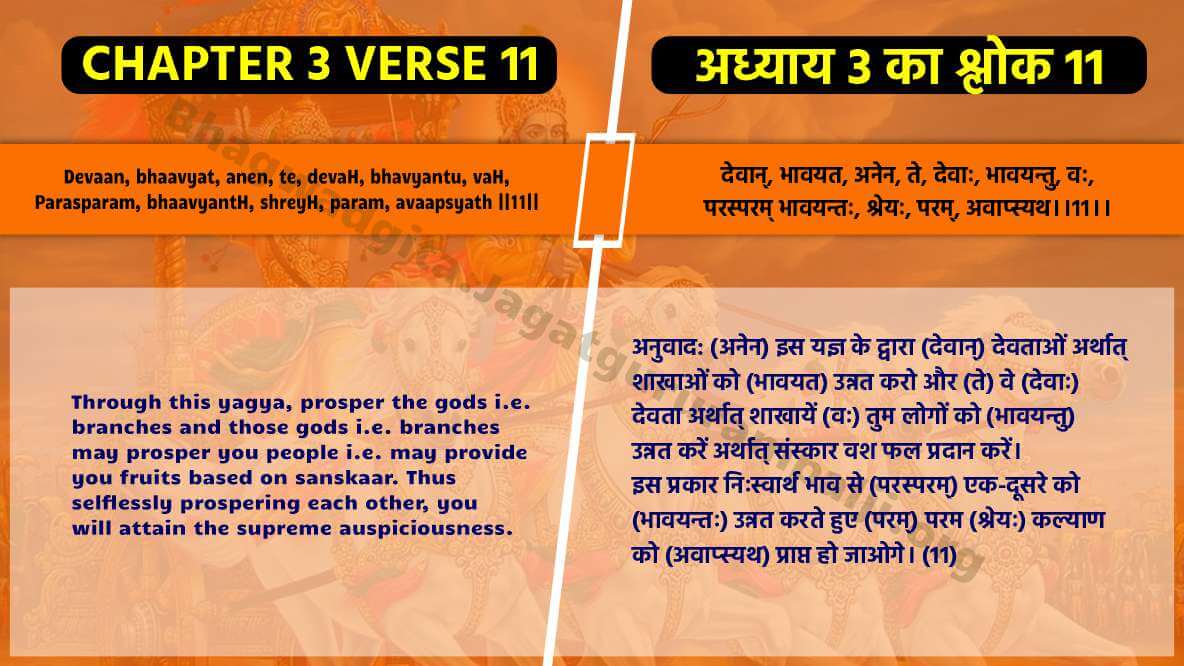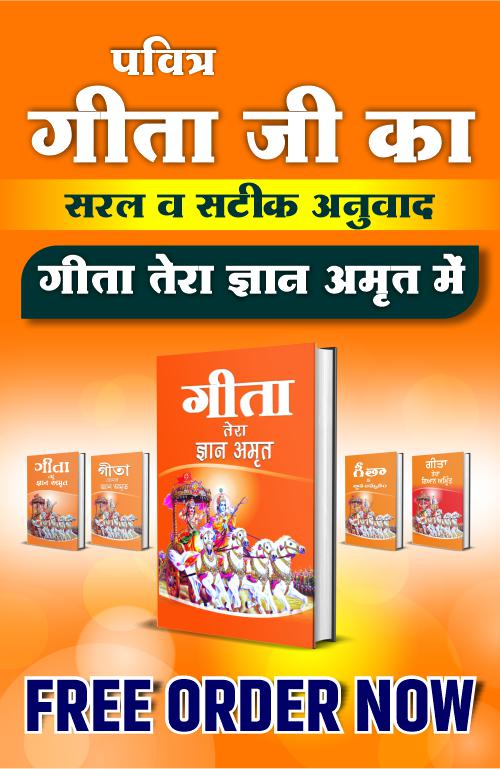
Devaan, bhaavyat, anen, te, devaH, bhavyantu, vaH,
Parasparam, bhaavyantH, shreyH, param, avaapsyath ||11||
Important: - In Gita Adhyay 15 Shlok 1-4, there is description of the upside-down hanging world-like tree. Its root (base) is the Purna Parmatma (Supreme God) and trunk is ParBrahm i.e. Akshar Purush and a bigger branch is Kshar Purush (Brahm), and smaller branches are the three gunas, Rajgun-Brahma Ji, Satgun-Vishnu Ji, and Tamgun-Shiv Ji. The tree receives its nourishment from the base (roots) only. Like, if we will plant a seedling of mango, then we will water the roots; from the roots, the nourishment will go to the trunk; from trunk to bigger branch; from the bigger branch to smaller branches, and then those smaller branches will bear fruits and those branches will themselves give us fruits. Similarly, by worshipping i.e. watering the Purna Brahm i.e. Param Akshar Brahm-like roots, the sanskar (impressions of nurture) i.e. the nourishment will go to Akshar Purush i.e. ParBrahm-like trunk; then from Akshar Purush, the sanskar i.e. nourishment will go to Kshar Purush i.e. Brahm-like bigger branch. Then from Brahm, the sanskar i.e. the nourishment will go to the three gunas i.e. Rajgun-Brahma Ji, Satgun-Vishnu Ji and Tamgun-Shiv Ji-like three smaller branches. Then these three gods-like smaller branches will bear fruits i.e. then the three gods, Shri Brahma Ji, Shri Vishnu Ji, and Shri Shiv Ji give us the fruits of our actions based on our sanskar (impressions of deeds done in the previous birth). This evidence is also given in Gita Adhyay 15 Shlok 16 and 17 that there are two gods in this lok of Earth; one is Kshar Purush i.e. Brahm and the other is Akshar Purush i.e. ParBrahm. Both these gods and all the living beings in their loks are perishable, in reality, the immortal God (Parmeshwar-Parmatma), who enters the three loks and sustains everyone, is different from the above-mentioned two gods. Please see the picture of the upright sowed plant of bhakti.
Translation: (Anen) through this yagya (devaan) gods i.e. branches (bhaavyat) prosper and (te) those (devaH) gods i.e. branches (vaH) you people (bhaavyantu) may prosper i.e. may provide the fruits based on sanskaar {impressions of deeds done in the previous birth}. Thus with selflessness (parasparam) each other (bhavyantH) prospering (param) supreme (shreyH) auspiciousness (avapsyath) will attain. (11)
Translation
Through this yagya, prosper the gods i.e. branches and those gods i.e. branches may prosper you people i.e. may provide you fruits based on sanskaar. Thus selflessly prospering each other, you will attain the supreme auspiciousness.
देवान्, भावयत, अनेन, ते, देवाः, भावयन्तु, वः,
परस्परम् भावयन्तः, श्रेयः, परम्, अवाप्स्यथ।।11।।
विशेष:- गीता अध्याय 15 श्लोक 1 से 4 में वर्णित उल्टा लटका हुआ संसार रूपी वृक्ष है, उस की जड़ (मूल) तो पूर्ण परमात्मा है तथा तना परब्रह्म अर्थात् अक्षर पुरुष है तथा डार क्षर पुरुष (ब्रह्म) है व तीनों गुण अर्थात् रजगुण ब्रह्मा जी, सतगुण विष्णु जी, तमगुण शिव जी रूपी शाखायें हैं। वृृक्ष को मूल(जड़) से ही खुराक अर्थात् आहार प्राप्त होता है। जैसे हम आम का पौधा लगायेंगे तो मूल को सीचेंगे, जड़ से खुराक तना में जायेगी, तना से मोटी डार में, डार से शाखाओं में जायेगी, फिर उन शाखाओं को फल लगेंगे, फिर वह टहनियां अपने आप फल देंगी। इसी प्रकार पूर्णब्रह्म अर्थात् परम अक्षर ब्रह्म रूपी मूल की पूजा अर्थात् सिंचाई करने से अक्षर पुरुष अर्थात् परब्रह्म रूपी तना में संस्कार अर्थात् खुराक जायेगी, फिर अक्षर पुरुष से क्षर पुरुष अर्थात् ब्रह्म रूपी डार में संस्कार अर्थात् खुराक जायेगी। फिर ब्रह्म से तीनों गुण अर्थात् श्री ब्रह्मा जी, श्री विष्णु जी, श्री शिव जी रूपी तीनों शाखाओं में संस्कार अर्थात् खुराक जायेगी। फिर इन तीनों देवताओं रूपी टहनियों को फल लगेंगे अर्थात् फिर तीनों प्रभु श्री ब्रह्मा जी, श्री विष्णु जी, श्री शिव जी हमें संस्कार आधार पर ही कर्म फल देते हैं। यही प्रमाण गीता अध्याय 15 श्लोक 16 व 17 में भी है कि दो प्रभु इस पृथ्वी लोक में है, एक क्षर पुरुष अर्थात् ब्रह्म, दूसरा अक्षर पुरुष अर्थात् परब्रह्म। ये दोनों प्रभु तथा इनके लोक में सर्व प्राणी तो नाशवान हैं, वास्तव में अविनाशी तथा तीनों लोकों में प्रवेश करके सर्व का धारण-पोषण करने वाला परमेश्वर परमात्मा तो उपरोक्त दोनों भगवानों से भिन्न है।
अनुवाद: (अनेन) इस यज्ञके द्वारा (देवान्) देवताओं अर्थात् शाखाओं को (भावयत) उन्नत करो और (ते) वे (देवाः) देवता अर्थात् शाखायें (वः) तुमलोगोंको (भावयन्तु) उन्नत करें अर्थात् संस्कार वश फल प्रदान करें। इस प्रकार निःस्वार्थभावसे (परस्परम्) एक-दूसरेको (भावयन्तः) उन्नतकरते हुए (परम्) परम (श्रेयः) कल्याणको (अवाप्स्यथ) प्राप्त हो जाओगे। (11)
